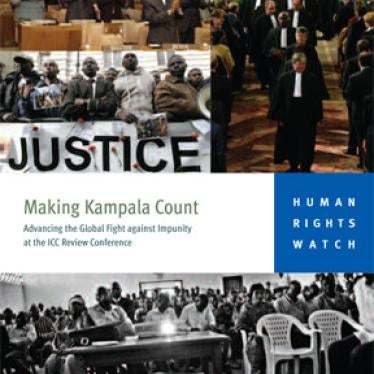At the International Criminal Court (ICC) review conference last month in Kampala, negotiations to add the crime of aggression to the court’s docket topped the agenda. The crime of initiating offensive warfare had been prosecuted after World War II. But when the Rome Conference established the ICC in 1998 as the first permanent court to try crimes against humanity, war crimes and genocide, it deferred a decision on aggression to another day.
Twelve years later, with the ICC’s first trials under way, its now 111- member states turned their attention to strengthening the court and the global fight against impunity. They also returned to the crime of aggression. The nations struck a deal at the last minute that paves the way for the court to take up the crime.
The ICC, however, will not be acting any time soon on aggression. The deal is subject to a further decision by ICC member countries no earlier than 2017. While this looks like a punt, it may give the court the time it needs to equip itself to meet the challenges of this crime. Explaining when, where and why the court can act is already a difficult task, as evidenced by the accusations that the court’s prosecutor was “targeting” Africa after the ICC issued an arrest warrant for President Omar Al-Bashir of Sudan. Never mind that three of the four situations before the court at that time had been referred by African governments themselves. Prosecution of the crime of aggression is likely to link the court to highly politicized disputes between states and will require further explanation of the ICC’s mission and mandate.
Time will tell the consequences of the decision on aggression, as well as of the compromises made to reach it. An exemption for crimes committed by nationals of states that are not ICC members—the United States, China, and Russia come to mind—is likely to fuel criticism of a double standard in international justice. Already governments that tolerate impunity in the Israeli-Palestinian conflict or in Sri Lanka, for example, weaken their calls for accountability elsewhere. At the same time, the deal resists attempts by permanent members of the United Nations Security Council to decide which aggression cases the court can accept.
It would be a mistake to assess the Kampala conference solely on the basis of the outcome on the crime of aggression, though. As significant as these negotiations were, much was also at stake when it comes to strengthening the current work of the court.
In days of debate, ICC members weighed in on challenges facing the development of international justice. New ideas were put on the table for strengthening national courts so that they also can try ICC crimes, as were tough questions about the relationship between pursuing justice during efforts to secure peace. States also considered how to bolster their cooperation with the court and to ensure that justice is not only done but seen to be done where it matters most—in communities where the crimes were committed.
Talk can be cheap, and will need to be backed up by action. But for a court that relies on states to arrest powerful suspects and enforce its decisions, and at a time when crimes that shock the world’s conscience continue in too many places, the discussions in Kampala were a good start.
Nearly 40 countries came to Kampala with over 100 pledges of increased assistance to the court. The ICC increased the number of states willing to enforce its sentences of imprisonment and reaped additional offers to assist with witness protection. The test of pledges will be if they are kept, of course, but we see the promise of re-invigorated commitment in the very fact that nations thoughtfully scrutinized the international justice process and made pledges where they saw a need.
The ICC members—known collectively as the Assembly of States Parties— came into their own in Kampala as a community of states united to fight impunity. Debate planted the seeds for revitalizing discussion of cooperation, including when it comes to assisting the court in arrests. It also laid the groundwork for coordination between states in rule-of-law reform that has as its goal equipping national courts to try ICC crimes—improving national capacity to prosecute international crimes will complement the ICC’s efforts.
Much depends on what happens next. Good ideas could all too easily be left behind in Kampala. There are existing challenges—the urgent need for a strategy to end the Lord’s Resistance Army’s reign of terror and arrest its leaders, wanted by the ICC since 2005. And there are new challenges on the horizon—the temptation to push aside the court’s warrant for Al-Bashir as Sudan’s referendum on secession nears. These and others demand that states build on the momentum generated by the conference to strengthen their commitment to the ICC.
To be sure, the court has its own homework to do seven years into its operations. Delays in the first trial have left it without yet a conviction. High expectations for justice for post-election violence that rocked Kenya in early 2008—the court’s newest investigation—need to be met. In the end, however, the ICC cannot succeed without its states. If the promise of Kampala to put a priority back on bringing to justice those responsible for the world’s worst crimes is realized, it will be a legacy well worth having.
Elizabeth Evenson - Counsel in the International Justice Program of Human Rights Watch, attended the International Criminal Court review conference, held in Kampala, Uganda.








